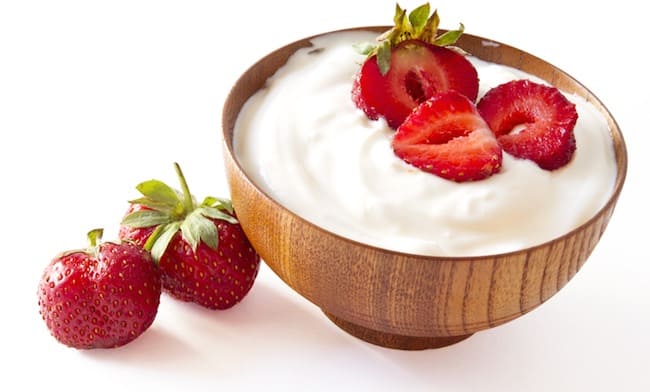
Benefits of Greek yogurt over traditional yogurt
In current fitness magazines the focus on Greek yogurt and its benefits due to its nutritional profile is under high attention. The sales of Greek yogurt according to data have doubled (every year) since 2006. Some give Greek yogurt a high rate due to its tangier and less sweet taste while others say that is much creamier than plain yogurt. But is it indeed healthier than regular yogurt?
Firstly, you should know that both types of yogurt, when their content is low in fat, can be part of a healthy diet. This is because both yogurts are low in calories, high in calcium as well as probiotics.
Greek yogurt is low in calories
However, there is an advantage that makes Greek yogurt on the top of yogurt types. In almost the same calories with regular yogurt, it can contain double the protein whilst eliminating the sugar contented by half.
For anyone then who seeks a creamier yogurt, a bit more protein in it and a low sugar profile, going Greek is absolutely a very good choice.
Nutritional profile of Greek yogurt
Below you can find out why Greek yogurt has such a great nutritional profile:
Protein
Greek style yogurt is high in protein thus it supports fullness. Specifically a typical portion of 200gr contains 15-20gr of protein. This amount corresponds to approximately 80-100gr of lean meat.
This high protein content makes it a great substitute for vegetarians, who many times struggle to get enough protein from their food sources. When compared to regular yogurt, the latter provides 9gr per 200gr which means that you may feel hungry much sooner. For more information you can also read: How to eat more protein without meat.
Carbohydrates
For dieters who are searching for low-carb snacks, going Greek is a very good choice. It specifically contains approximately half the carbs (5-8gr) when compared to its regular counterpart (13-17gr). What is more, during the straining procedure, a great amount of the sugar lactose is removed thus giving Greek yogurt less probability to distress those who are lactose-intolerant.
It is good to know though that both kinds of yogurts can contain high dosages of carbs if they’re packed either with sugar or an alternative sweetening equivalent. Thus, regardless the type of yogurt you will choose, go for the one that contains the less sugar.
Fat
Regarding the fat content in Greek yogurt, be aware that in just 250gr Fage’s full-fat Greek yogurt there are 16gr. of saturated fats. That means that a yogurt like that contains the 80% of your total daily allowance if you are following a 2000 calories diet.
Although lately saturated fat has taken of the guilt of provoking bad cholesterol’s increase, however, significant health benefits have been proved when are replaced by mono or poly-unsaturated fats. Thus, if you are choosing Greek yogurt, go for the low-fat and free of fat versions.
Sodium
A classic Greek yogurt contains 50mg of sodium, almost half of the content in most regular yogurts. It is already known that high consumption of salt can increase blood pressure and therefore the risk of hypertension and other heart related problems.
According to government’s 2010 Dietary Guidelines it is urged that people should limit sodium at 2,300mg per day or 1,500mg if they are above 50 years old. These recommendations were set regardless different kind of diseases (diabetes, hypertension or kidney diseases). Read also: 5 simple ways to reduce sodium intake
Calcium
Although Greek yogurt contains less calcium than its regular counterpart; this is because Greek yogurt is being strained. However, it still contains a descent amount of that nutrient.
A 200gr portion contains approximately 20% of the recommended daily allowance. If you are still concerned about calcium intake from your food, dietitians’ advice is to load up on almonds, milk and seeds.
If you are still undecided on which yogurt to choose, compare the nutritional labels below, and find out why Greek yogurt is much better than the regular one.
| Greek (200gr, nonfat) | Regular yogurt (200gr, nonfat) | |
| Calories | 90 | 80 |
| Fat | 0gr | 0gr |
| Cholesterol | 10mg | 5mg |
| Sodium | 50mg | 120mg |
| Sugar | 6gr | 12gr |
| Protein | 15gr | 9gr |
| Calcium | 15% of a 2000calories diet | 30% of a 2000calorie diet |
Greek yogurt is good for you…
Finally, if you are going to choose Greek yogurt, I would suggest taking advantage of its potential to versatile easily. For example, mix it with seasoning like dill, parsley and garlic to create the unique Greek dip called “tzatziki”.
Enjoy your dip by using cucumber slices, carrots or simple bread. You can also make it high in fiber by tossing in some blueberries or granola. You may also replace the full fat sour cream on tacos with Greek yogurt.
In general Greek yogurt is the great substitute for fatty ingredients like mayonnaise, butter and creamy cheese. Its taste is unique and can leave a refreshing aftertaste.
Regarding the price, it is true that sometimes, Greek style yogurts are more expensive than regular ones. However, if you are considering the health benefits of the yogurt you choose, then it is better to go “Greek”.










